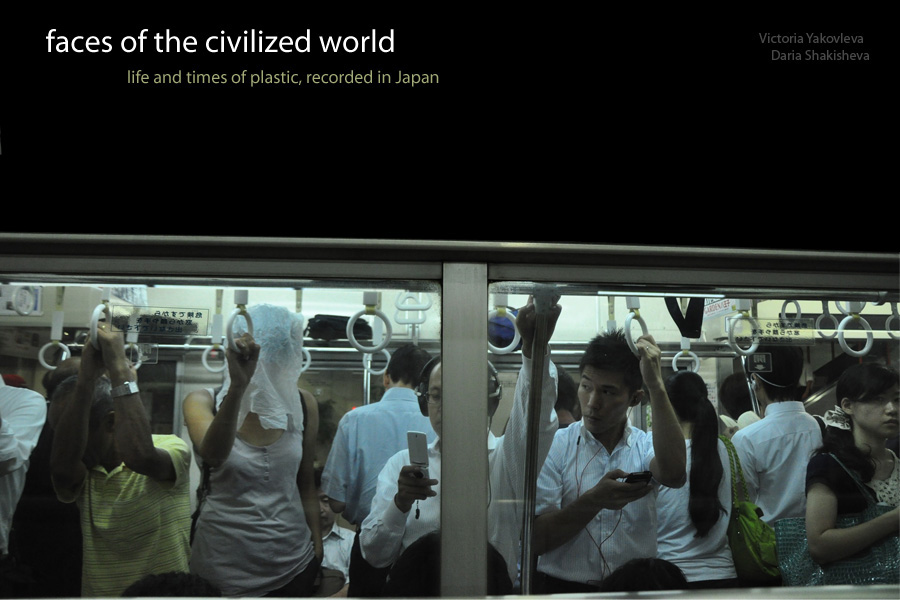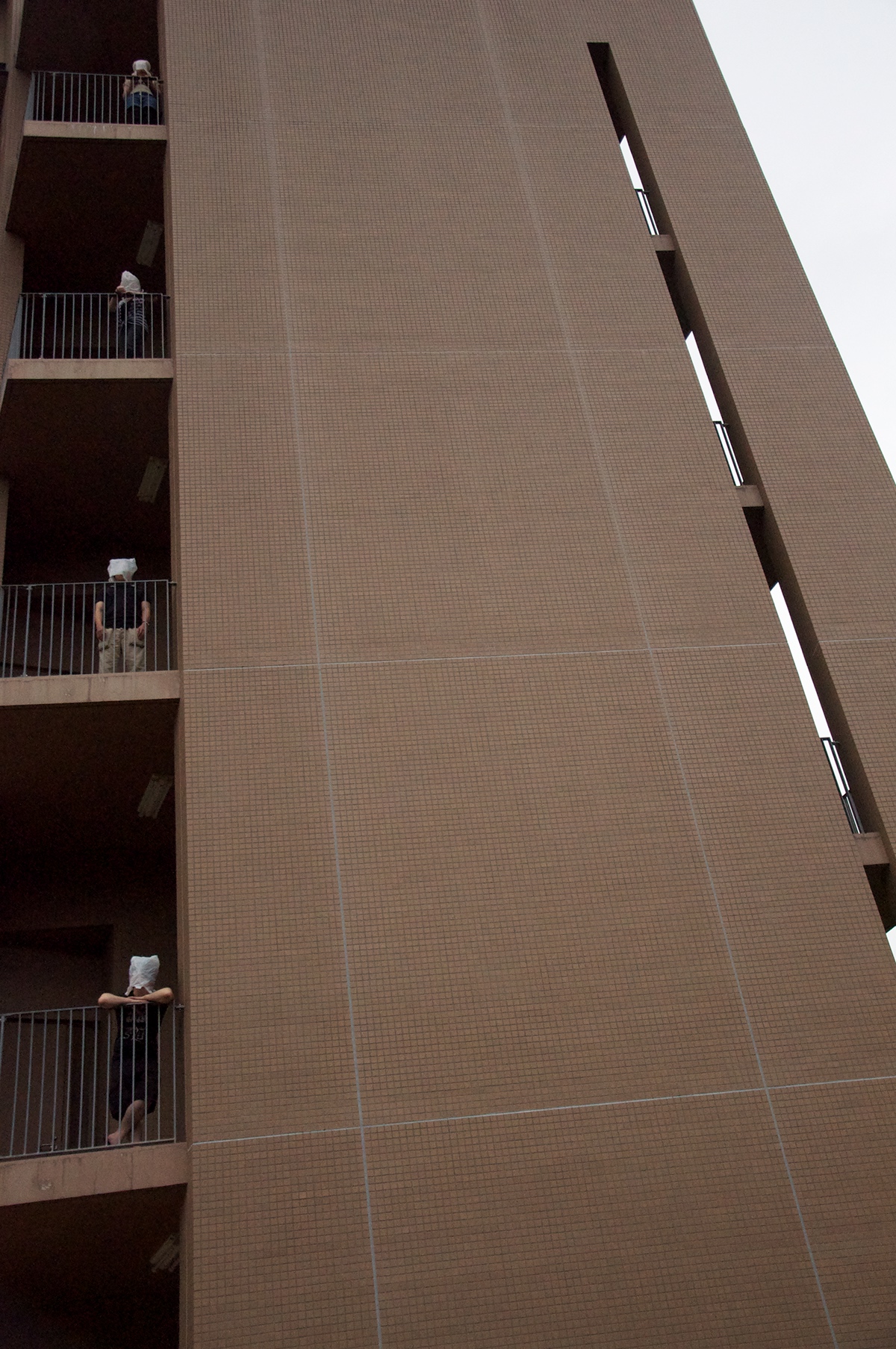
This project is an artistic inquiry into the environment created by our modern civilization. Our little theatrical sketches are an open reflection on some of the main functional elements that constitute this environment, and on the logic behind some of its common routine.
Our setting is Japan, and that is not without a reason.
In terms of technological development, infrastructure, social welfare systems Japan may be considered one of the most progressive countries in the world. In many ways it presents a favorable example for the most developed countries to follow. This is also why even very particular forms and shapes that civilization acquires in Japan can be seen as symptomatic in a global sense: they are all related to essential trends that take effect all around the world in one way or other. Japan's scenarios may be unique in the details, but with certain adjustments it's not all too hard to project them on the situation of many other countries.
Apart from thinking Japan to be a particularly colorful "civilization's case", simply being foreigners played a key role in the inception of this project. One is more susceptible of noticing peculiarities in the most common of things when they are a stranger to their surroundings, and are conditioned to look at everything around as alien.
Common things are things we don't easily subject to critical reflection. We are suggesting to take an estranged look at the environment that we interact with every day, as if it was something alien.
Victoria Yakovleva
ography, concept)
Daria Shakisheva
(original idea, concept)
Our setting is Japan, and that is not without a reason.
In terms of technological development, infrastructure, social welfare systems Japan may be considered one of the most progressive countries in the world. In many ways it presents a favorable example for the most developed countries to follow. This is also why even very particular forms and shapes that civilization acquires in Japan can be seen as symptomatic in a global sense: they are all related to essential trends that take effect all around the world in one way or other. Japan's scenarios may be unique in the details, but with certain adjustments it's not all too hard to project them on the situation of many other countries.
Apart from thinking Japan to be a particularly colorful "civilization's case", simply being foreigners played a key role in the inception of this project. One is more susceptible of noticing peculiarities in the most common of things when they are a stranger to their surroundings, and are conditioned to look at everything around as alien.
Common things are things we don't easily subject to critical reflection. We are suggesting to take an estranged look at the environment that we interact with every day, as if it was something alien.
Victoria Yakovleva
ography, concept)
Daria Shakisheva
(original idea, concept)

The main character of our stories ends up being a plastic bag. Or, more generally, just plastic. There is hardly any other agent inside the civilized space that is as tightly involved in virtually all of its systems. Plastic is one of the most frequent mediators of our interaction with the world around us.
That is why we chose plastic to represent civilization as its acting subject, assuming for it qualities of a human individual.
prologue
whatever is the origin of plastic, it feels at home everywhere.
whatever is the origin of plastic, it feels at home everywhere.
no environment is a better illustration of its nature than the other, because it blends in in any environment
birth
arrival
equation
discovery
self-consciousness
endeavor
integrity

solitude
obtaining forbidden knowledge, exile from eden and the origin of civilization
obtaining forbidden knowledge, exile from eden and the origin of civilization

verticality / society
technologies / onto the assembly line
no identification

living space

acquired locality
healthy lifestyle
jogging
gymnastics
swimming
soccer
aberration / search for perspective

culture
is what we consume
is what we consume

being on the same page

relaxation
corporate life
overtime + night out with colleagues
overtime + night out with colleagues

corporate life

salvation
search for happiness + fear of death
search for happiness + fear of death
birthday
with friends
with friends

return to the origins
rejoicing in nature's primeval harmony of existence
rejoicing in nature's primeval harmony of existence

escape
setting off into endless wanderings
setting off into endless wanderings
like you do
arrival into endless nowhere
search for one's self / mineral water

intermission : summertime


deviation
an experience of a strange shift in all perceptions
an experience of a strange shift in all perceptions
identity crisis
general confusion

out of the depths of one's familiar self emerges the Other
moon
reclaiming once lost reality
reclaiming once lost reality
sky

Matisse's "Dance"
celebrating the recovery of the joy of life
celebrating the recovery of the joy of life
appropriation
water and wind
water and wind
appropriation
all elements
all elements

PS:
Japan is a nation of an outstanding concern for recycling civilization's waste. Few other nations put as much effort to keeping one's surroundings clean. It is a country where people carry all their garbage with them for as long as is needed until they can properly dispose of it.
At the same time Japan may be the champion in the amount of plastic daily utilized and disposed of by an average person.
Japan is a nation of an outstanding concern for recycling civilization's waste. Few other nations put as much effort to keeping one's surroundings clean. It is a country where people carry all their garbage with them for as long as is needed until they can properly dispose of it.
At the same time Japan may be the champion in the amount of plastic daily utilized and disposed of by an average person.


